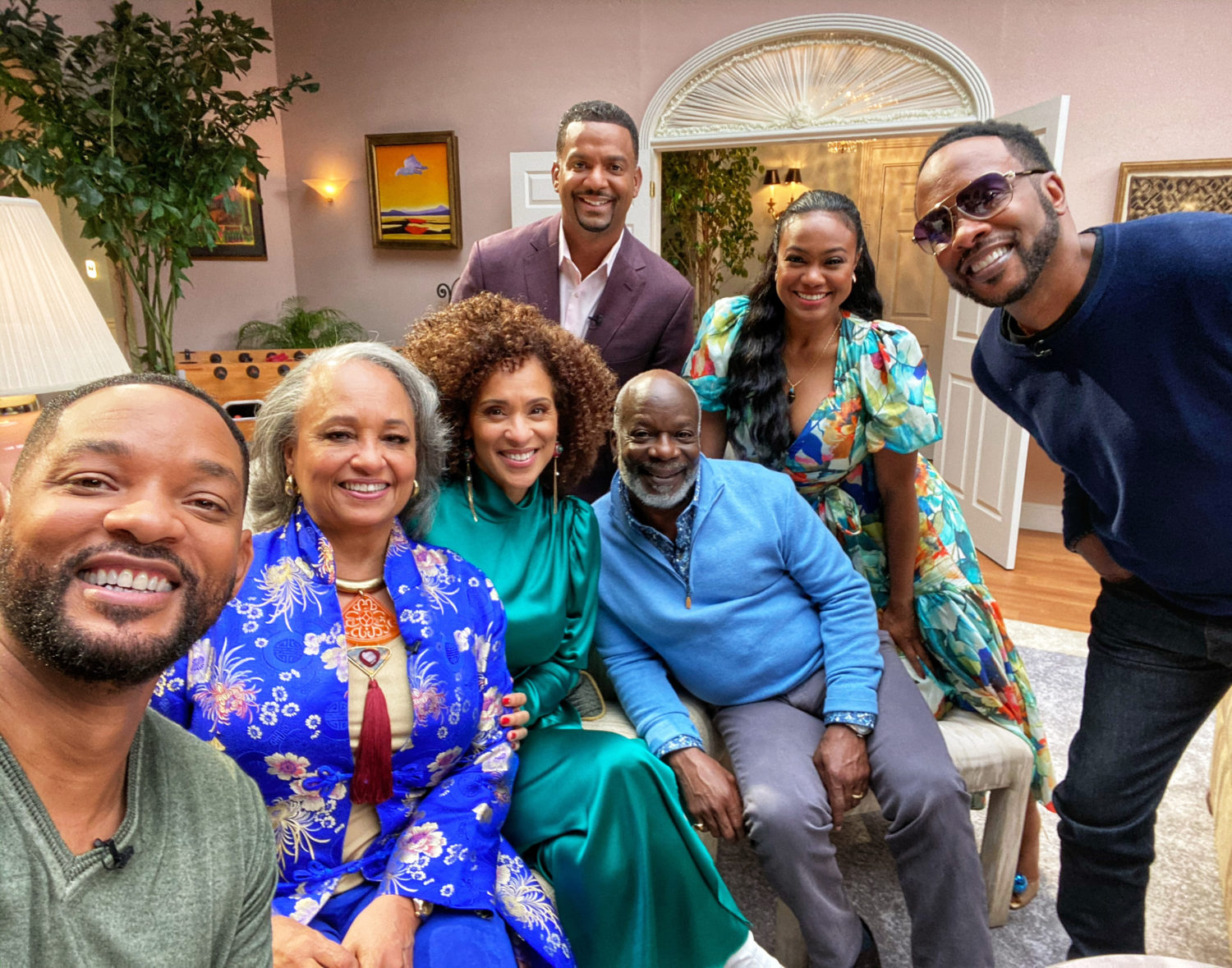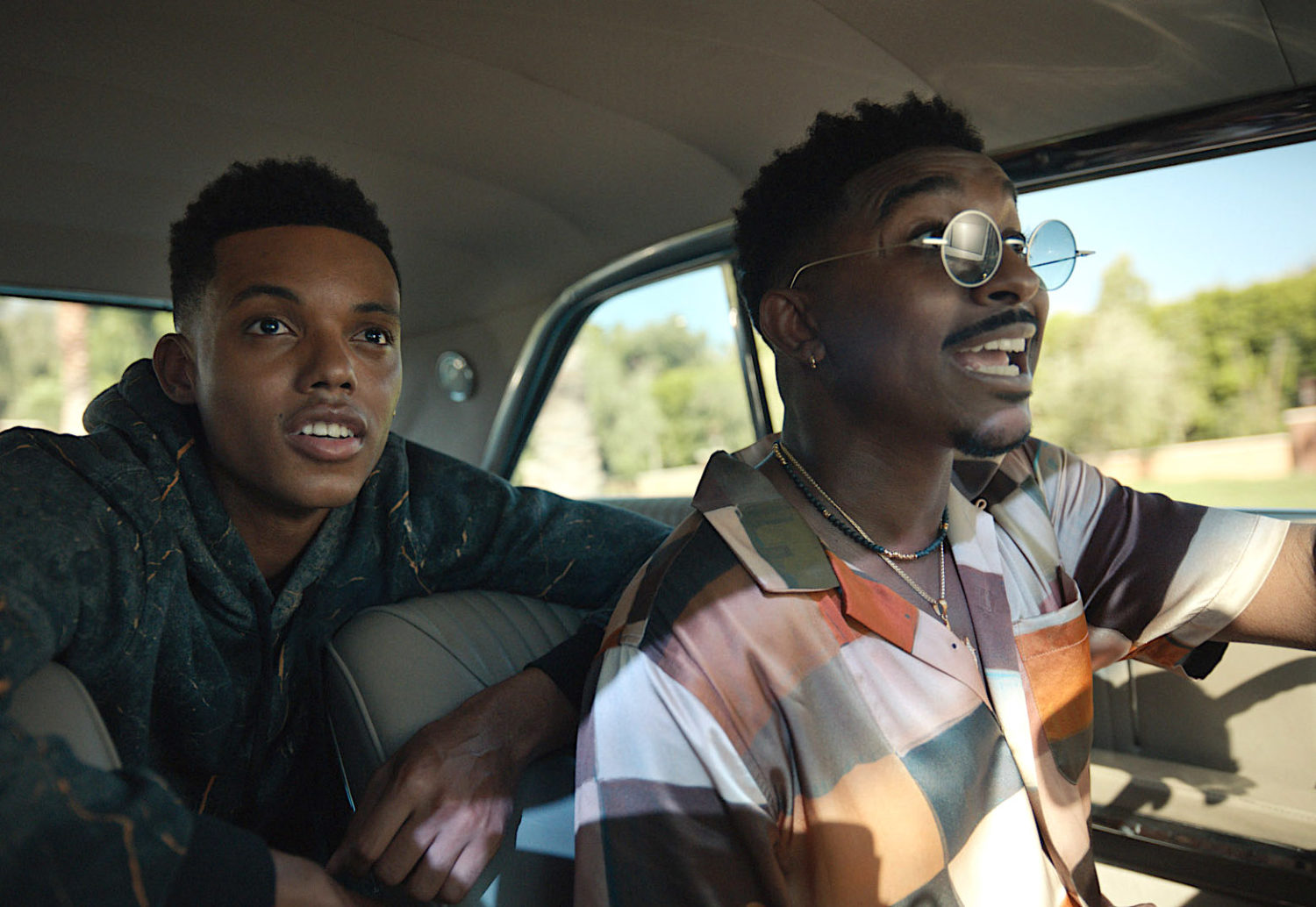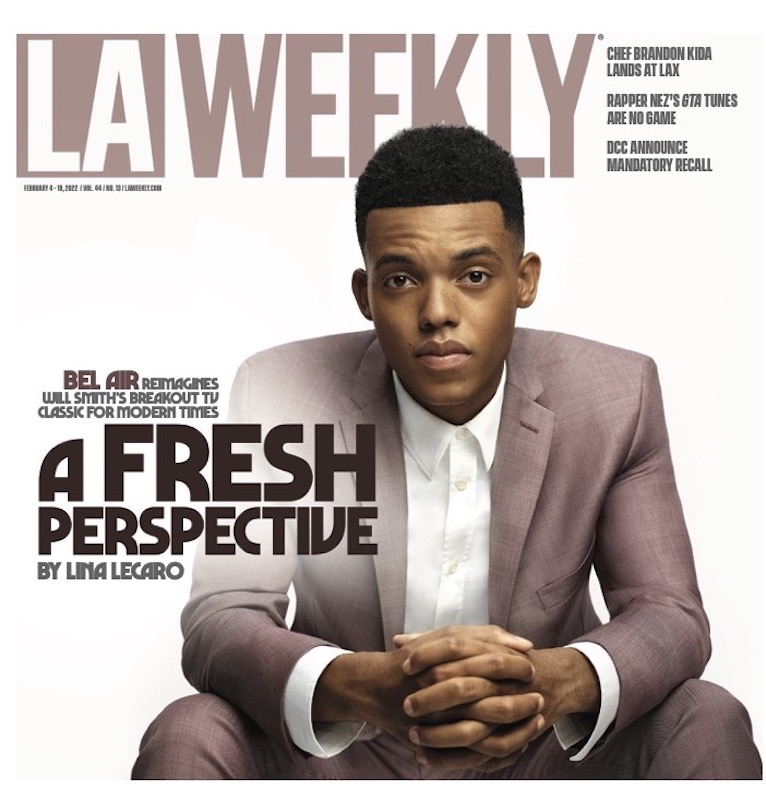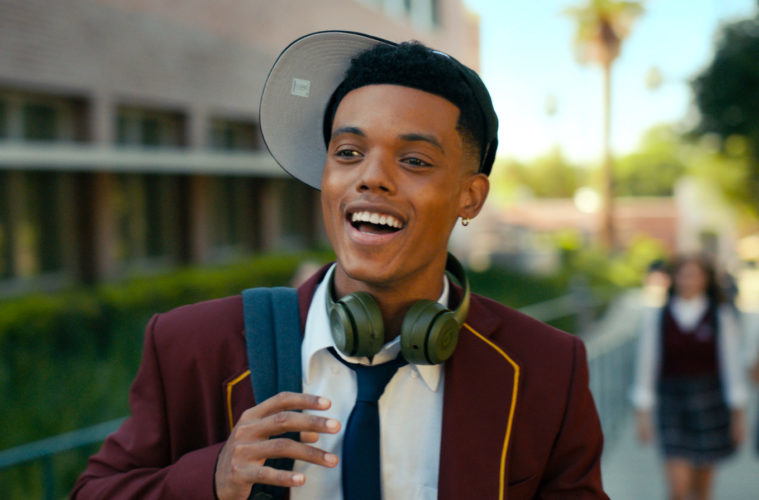Now, this is a story all about how
My life got flipped, turned upside down
And I’d like to take a minute
Just sit right there
I’ll tell you how I became the prince of a town called Bel-Air
In West Philadelphia born and raised
On the playground was where I spent most of my days
Chillin’ out, maxin’, relaxin’, all cool
And all shootin’ some b-ball outside of the school
When a couple of guys who were up to no good
Started making trouble in my neighborhood
I got in one little fight and my mom got scared
She said, “You’re movin’ with your auntie and uncle in Bel-Air”
“Yo Home to Bel-Air” (DJ Jazzy Jeff & The Fresh Prince)
The fish-out-of-water fable might have been done before Will Smith won America’s hearts on the NBC sitcom The Fresh Prince of Bel-Air, but the vibrant family dynamics and feel-good groove of the show was unique. The comedy’s clear intention to highlight the breadth of Black narratives provided astute portrayals that shed light on differences in background and class. Exploring struggle and privilege, Fresh Prince showed everyone that the African-American experience has never been monolithic, and it did so with laughter and love. When the show ended 24 years ago, other Black comedies sought to capture its vibe, but none did it with quite the same effervescence. Nobody really came close to filling Smith’s Air-Jordans either, and after the rapper/actor’s charismatic TV turn, his subsequent mega movie star career came as no surprise to anyone.
Fresh Prince was a wacky comedy on the surface, but as Smith himself said in the show’s HBO Max 30th anniversary reunion special last year, it was also “revolutionary” and “poignant,” enough to make an impact both when it aired in the ‘90s and via reruns, earning a multi-generational and multi-racial fan base that endures to this day.

The Fresh Prince Reunion Special (Courtesy Will Smith/HBO Max)
It definitely inspired Morgan Cooper, a young filmmaker from Kansas City, Missouri, who just a couple years ago, decided to reimagine the tale of a young man from Philadelphia sent to live in Bel-Air with his rich aunt and uncle. His 2019 “trailer,” called Bel-Air, hyped a dramatic rendering of the story, in which Will’s fight with some bad dudes on the court takes on a grittier tone, including gun possession, overzealous police and subsequent threats to his life by the thugs, forcing his move to L.A.
The “fan film,” as many called it when it was first released, went viral pretty much immediately after it was posted to YouTube, catching the attention of Smith himself not long after. Now, it’s a full-fledged TV drama premiering on Peacock on Superbowl Sunday, Feb. 13.
Co-produced by Smith’s production company Westbrook Studios with Cooper at the helm, Bel-Air has been privy to plenty of buzz thanks to its online origins and the star’s involvement, but it’s also gotten some not-unexpected backlash due to its reboot premise. Even Saturday Night Live took a poke, suggesting the next nostalgic comedy redo might be a tough take on Family Matters’ Steve Urkel.
But as Cooper tells it, Bel-Air really isn’t a reboot. “It shows honor and respect toward the sitcom, but it’s something that really does stand on its own,” he shares with Irvine Weekly by phone from the set. “Here’s the thing, my job is not to try to convince people to like or dislike reboots or anything like that. Candidly, I’m not a fan of most reboots. I think a difference in our show is the fact that it’s a very specific vision. You know, this wasn’t an idea that was birthed in a boardroom or on a studio lot. This was an idea that was formed while I was driving down the 71 highway in Kansas City. It came from a very, very pure place. And I think people resonate with that and people will be able to sense that watching the show. There’s a very specific perspective and there’s a handmade quality to our show that maybe they haven’t seen before in something that is reimagined. “
Though Cooper was already an up-and-coming filmmaker (he was even recognized by the Tribeca Film Fest for his work last year), he says he made the trailer with no plan or plot. “Making the short film, it was just about expressing this idea that I was really passionate about. It was something that, ‘I want to watch this,’ you know what I mean? And I felt like it was something that would be really exciting for the culture. At the same time, I did recognize that it was a valuable idea. But I love the art, and I love making the art so that’s where my focus was. Let’s create this thing and bring this vision to life on screen. I remember when I finished the edit and I knew that I hit the mark of my vision. It wasn’t too much later that Will’s company reached out.”
Smith’s support went beyond the initial project greenlight, too. When West Philly resident Jabari Banks won the lead role last Summer, Smith himself made the Zoom call to inform him – a feel-good exchange that was shared on Peacock’s YouTube channel – and seemed right in every way, considering the young actor’s similar background, his resemblance and even his last name, which is the same as the family’s on the show.
“My whole life, people have been telling me I kind of resemble Will, and you know, his mannerisms, and we’re from the same place,” Banks tells us by phone during a filming break. “So, you know, I definitely felt like I was right for the role. I went through the whole audition process. And at the end, I got that surprise call from Will. That was a trip because I thought that was gonna be another audition… I was like, I don’t know what they need to see but I was gonna bring it. And then I got on the call and he’s like, ‘I want to congratulate you.’ That was such a huge day I’ll never ever forget.”
Banks says he’s spoken with Smith a few times since snagging the role. “He called me over Christmas break after he had seen the first episode,” he recalls. “And Jaden hopped on FaceTime, too. He’s like, ‘Yo, the pilot was crazy man; you embody my dad perfectly.’ So to get the Smith family stamp of approval is so huge for me. And it’s huge for the show. I’ve read Will’s book, his words… It’s so good. I definitely grew up looking up to him as an artist and he’s such an inspiration to me in the way that I go about life.”
Judging from the first three episodes provided for the media, fans of Smith will have much to adore about Banks, who channels his swagger and style even as he shows his naivete and immaturity about how the world works sometimes. As he did back in the ’90s, the fresh prince still has a lot of growing up to do. When he gets to L.A., the life lessons to come will present challenges, many of them relatable to teens and especially Black teens, but also unique to a character with wealthy relatives. The aspirational elements and luxe backdrops are extremely watchable – from the Banks’ gorgeous Black art-filled home (matriarch Vivian Banks is an art teacher) to everyone’s impeccably styled wardrobe. Aside from the look, the tone is serious but maybe a bit lighter than Cooper’s short, evoking effective soapy family dramas, from Dynasty to Empire, with a sprinkle of 90210-hued wholesomeness. The show is rated TV-MA, but so far, it’s forgone the Euphoria shock value-driven depiction of adolescents in favor of something more hopeful.
As it should be, Bank’s take on the main character is the most similar to the original we know and love. Other players – Aunt Viv and Uncle Phil, their kids Carlton, Hilary and Ashley, house manager Geoffrey – possess what Cooper calls “a fundamental essence of the original sitcom characters, but with their own authorship.” The reimagining here is mostly concerned with what these characters might be like in today’s world and how they might have evolved in modern day.
Carlton, originally played by Alfonso Ribeiro, was a sheltered, big-hearted, bad-dancing dork, but on Bel-Air, Olly Sholotan plays a more complex version of him – an overachiever with a drug problem whose relationship with his dad is threatened by Will’s arrival. Similarly, former Disney actress Coco Jones’ embodiment of Hilary is an amusing contrast to the spoiled princess we saw Karyn Parsons play for laughs on the original show. This Hilary might wear designer duds and display self-absorbed tendencies; she’s a budding chef (and a social media influencer, naturally), but she’s also more headstrong, ambitious and proud, notably turning down a job that would’ve increased her following due to the company’s discriminatory policies.
“The goal with Hilary was for girls who are bosses and the girls who have these big dreams to see themselves in her,” Jones says of her character. “I also think the conversation about representation is important. Being a dark-skinned Hilary and to see myself represent beauty and being sexy and classy without any preconceived idea of what that’s supposed to look like, and really changing up what people assume that it’s going to look like, for me, it’s so important.”
Cassandra Freeman, who plays Aunt Viv, has similar feelings about her role. Of course, there was controversy surrounding the original Vivian Banks on TV, who was played by Janet Hubert for three seasons, before a dispute with the producers led to her getting recast with actress Daphne Maxwell Reid. During the recent reunion show, Hubert and Smith put aside their differences, but the contentious recasting so many years ago remains a blemish on Fresh Prince’s otherwise positive history.
Freeman acknowledges both actresses as iconic in the role. “I think it’s hard not to think about… they are imprinted in my brain, like tattooed. [The producers] made it very clear that we’re not trying to fill those shoes,” she maintains. “The thing that I really wanted to bring to this version of Viv is that she’s very much grounded in the place where she came from, which is Philadelphia. I wanted her to feel much more modern, as someone who’s comfortable in her roots, and she just happens to be surrounded by luxury. That was the main thing. And, you know, I want her to have some exuberance, as well. So I think as the season goes on, you’ll see a lot of her light and vivacious side.”
While the characters, storylines and mood of Bel-Air are markedly different from the sitcom, pretty much every episode does include a reference big or small to the past. From Will drinking champagne and OJ on the plane ride to L.A., to his decision to wear his school jacket inside out, to the fuzzy dice in his pal Jazz’s car, fans are given just enough clever nods to evoke nostalgia, but never at the expense of the new stories they want to tell.

Jabari Banks as Will, Jordan L. Jones as Jazz (Courtesy Peacock)
“We have really made it a point to pay homage to the original, but also give new fans something exciting to watch,” Banks enthuses. Cooper concurs, but stresses that the easter egg moments are not prescriptive. “For us, it’s just a fun way to pay up. You know what I mean? Like, there’s no quota. At the end of the day, I’m a fan of the sitcom like we all are fans, and whenever we can find places to organically put fun little references for fans of the original, we do it, but it definitely doesn’t come from a place of checking boxes or anything like that. You know, it is fun for viewers. It’s fun for us.”
Despite the good times it hopes to share, Bel-Air is focused on having important conversations about race and class, which are, of course, more relevant than ever right now. The original show was based on music mogul Benny Medina’s life growing up as a poor Dominican kid in East Los Angeles. After his mother died and his father abandoned him, Medina moved in with a well-to-do white friend and his family as a young man, leading to more opportunities, including attending Beverly Hills High. The culture clash-based story was changed to a rich Black family in an effort to explore the nuances of black-on-black prejudice, class and privilege.
After producer Quincy Jones came on board, acting novice Smith aka rapper Fresh Prince (who had some success with his partner DJ Jazzy Jeff with the hit, “Parents Just Don’t Understand”), was asked to audition at Jones’ star-studded birthday party. As Smith recounted during the reunion show, contracts were signed that same night, with the story pivoting to a Philly transplant narrative. The pilot was filmed three months later in May of 1990.
Many memorable Fresh Prince of Bel-Air episodes tackled race issues head-on. From Carlton and Will getting pulled over by cops in Palm Springs, to Aunt Viv teaching a Black history course at the boys’ school, to the boys’ bet that Carlton couldn’t last one night in Jazz’s neighborhood (MacArthur Park). It will be interesting to see if these specific scenarios will be explored on Bel-Air, but either way, the wider issues behind them surely will. There’s no denying that the dramatic format allows for a heavier and more enhanced look at these issues. Bel-Air’s initial episodes show discourse over the N-word in music (Carlton’s white friend uses it while singing along to a song, which elevates tensions between him and Will, fueling their rivalry), while Uncle Phil’s run for office becomes challenging as the affluent attorney strives to prove he’s not out of touch with lower and middle class people of color in Los Angeles.
“It’s important for us to have those uncomfortable conversations,” Cooper asserts. “That’s how we get to a place of empathy. That’s what I think the magic of the show is. You see two young black men who had very different upbringings, have a conversation about something that is incredibly timely and relevant in our country. Being able to hear both sides of that discussion, you know, the hope is that it leads to an even deeper conversation, far beyond and after the credits roll.”
BEL-AIR airs three episodes back-to-back on Peacock, beginning Sun., Feb. 13. New episodes roll out each week after that. More info at Peacocktv.com.

This week’s LA Weekly cover story. (Photo courtesy Peacock)
Advertising disclosure: We may receive compensation for some of the links in our stories. Thank you for supporting Irvine Weekly and our advertisers.

